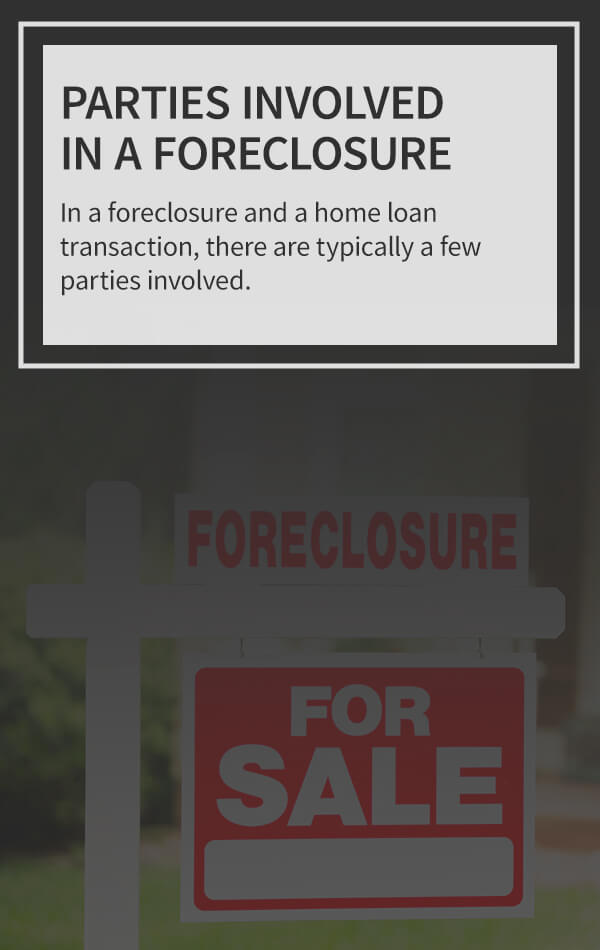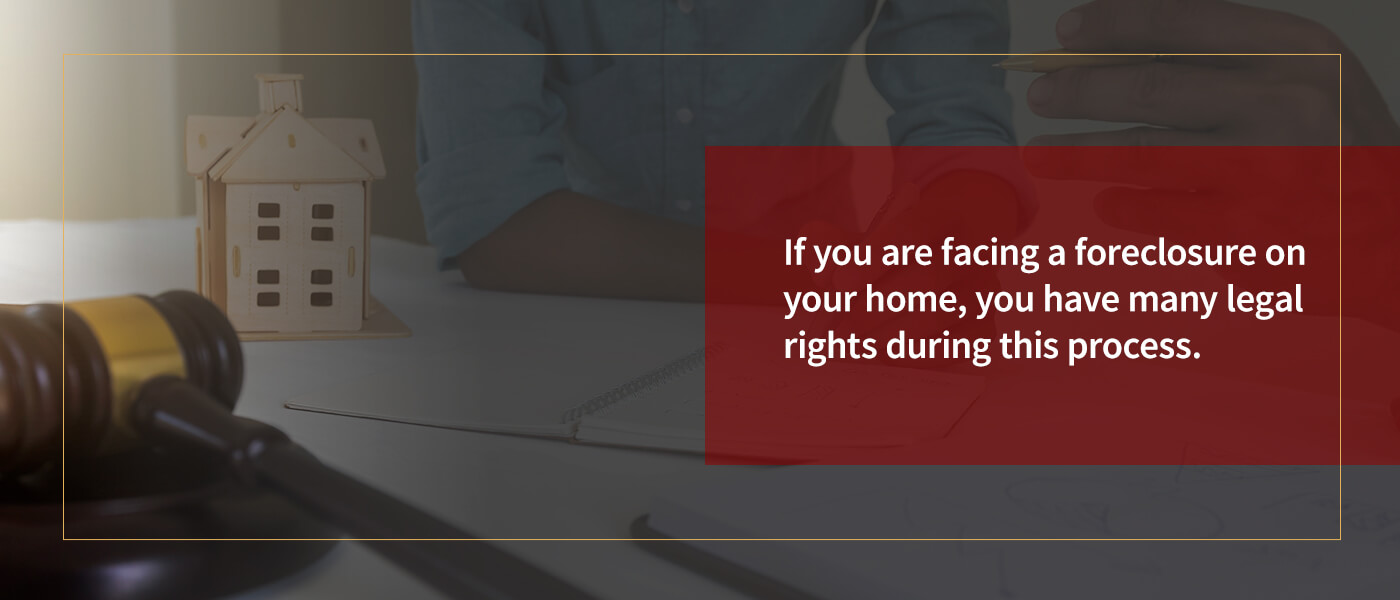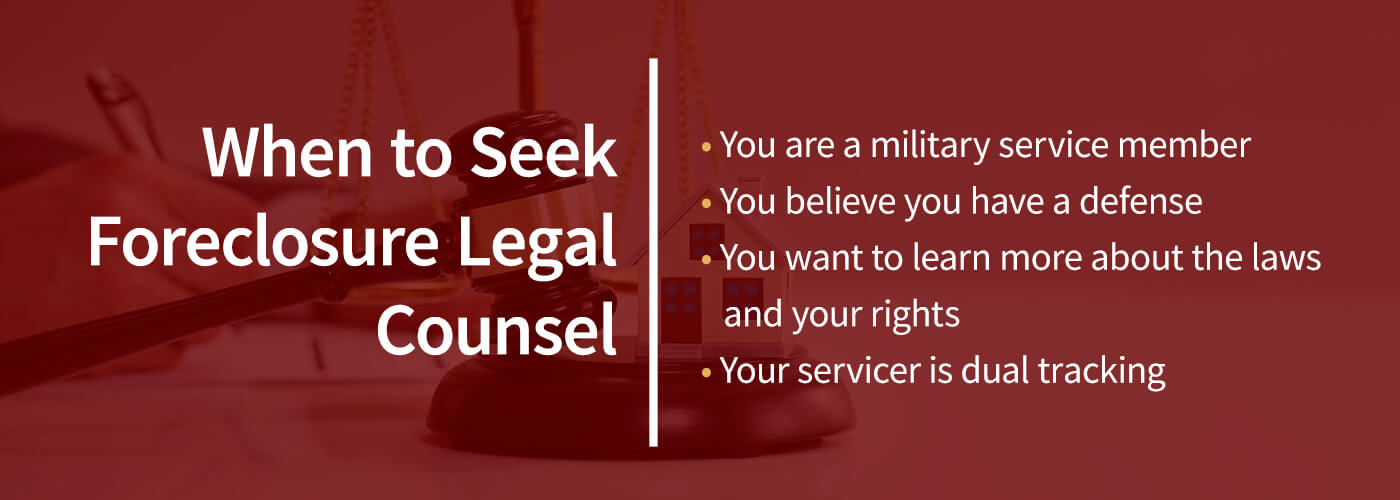If you are struggling to pay your mortgage every month, you may be facing foreclosure and the risk of losing your home. Foreclosure can be a rigorous legal process, and you have legal rights based on your mortgage documents and the laws in your state. When you know your legal rights under foreclosure law, you can better navigate the foreclosure process or avoid it altogether if your lender is in violation of any foreclosure requirements.
Overview of Foreclosure Process and Laws
Foreclosure is a legal process in which a lender recovers the balance remaining on a defaulted loan. This is accomplished by taking ownership of the mortgaged property and selling it as collateral. Default is typically triggered by nonpayment, but it can also occur when a borrower does not meet other terms of their mortgage contract.
Loss Mitigation
After you miss your first payment, your loan servicer will contact you by phone to discuss loss mitigation. Your loan servicer handles your mortgage account and may currently own your loan. During the loss mitigation process, you and your lender will work together to determine whether a foreclosure can be avoided.
Your loan servicer will also notify you about loss mitigation options in writing and provide a referral for someone who can assist you in avoiding foreclosure. Typically, a servicer cannot foreclose on a home until a borrower is a few months behind on payments.
Breach Letter
A clause is generally included in a mortgage contract that states a lender must send you a written notice known as a breach letter. This letter lets you know when you are in default on your loan, and it includes the following:
- Details about your defaulted loan and the causes of the default
- The deadline by which you must fix the default
- How you can fix the default and reinstate your loan
- Notice that if you fail to cure the default by the deadline, this will result in the sale of your property
To avoid foreclosure and cure the default, you should pay the full amount by the date included in your breach letter, including any penalties, late fees, and back interest. If you do not pay the amount by the due date and have not chosen another option, foreclosure proceedings may begin.
Notice of Foreclosure
If you have a pending foreclosure, you are entitled to receive a notice regardless of the state in which you reside. If it is a judicial foreclosure, you will receive a complaint and summons informing you that the foreclosure has initiated. For a nonjudicial foreclosure, you could receive two notices.
- Notice of default: Depending on the laws in your state, a nonjudicial foreclosure begins when the notice of default (NOD) is recorded. The NOD is a public notice that your loan is in default and contains details about the lender, borrowers, trustee, default, property, action needed to cure the default, and a statement about the deadline for when the default should be cured.
- Notice of sale: The notice of sale may be posted on the property, mailed to you, published in a local newspaper, and added to the county’s land records. This notice includes a statement noting the property will be sold via a public auction, details about the property, and information about the sale.
You may have a defense to your foreclosure if you do not receive the appropriate notice according to the foreclosure laws in your state. While this does not necessarily mean you can avoid foreclosure, it may force your loan servicer to issue a new foreclosure notice and begin the foreclosure process again. This may give you enough time to catch up on payments or find another option.
Parties Involved in a Foreclosure
In a foreclosure and a home loan transaction, there are typically a few parties involved. These parties include:
- Lender: Your lender, also referred to as the mortgagee, originates your loan.
- Borrower: You are the borrower or homeowner if you borrow money via a home loan and pledge the house as collateral to your lender for the mortgage loan. The borrower is also referred to as the mortgagor.
- Investor: Investors purchase loans from lenders. Examples of investors include Freddie Mac and Fannie Mae.
- Loan servicer: The loan servicer is the company that handles your loan account and the company to which you make monthly mortgage payments. The servicer is often a third party that manages your loan account on your lender or investor’s behalf. A loan servicer’s duties include processing and collecting loan payments and monitoring and initiating a foreclosure if a borrower stops making mortgage payments.
Each Party’s Legal Rights in a Foreclosure
If you are facing a foreclosure on your home, you have many legal rights during this process. State and federal laws provide strong protections as a homeowner, and you also have rights under your mortgage or deed of trust. When you understand your rights and use them to your benefit, you may be able to save your home. Below are some of the rights of borrowers under foreclosure law:
1. Right to Look for an Alternative
Under certain state laws and federal mortgage servicing laws, you can discuss and apply an alternative way to avoid foreclosure. For instance, you may be able to continue living in your home if you work out a modification, or you may be able to avoid foreclosure by completing a deed or short sale instead.
2. Right to a Foreclosure Notice
In each state, a foreclosing bank is required to provide borrowers notice if there is an impending foreclosure. Depending on the circumstances and laws in the state, the foreclosure will either be considered judicial or nonjudicial:
- Judicial foreclosure: If you are facing a judicial foreclosure, your notice will be a complaint and summons, which will be served to you. Additionally, you may receive notices about a foreclosure mediation and other resources available to help you avoid foreclosure.
- Nonjudicial foreclosure: If you are facing a nonjudicial foreclosure, the notice requirements tend to vary among states. For example, state law may require the bank to send you a notice of sale or notice of default. In your state, this notice of foreclosure may include posting a notice in a public location or on the property and publishing information about the property’s sale in a newspaper.
3. Right to Receive a Breach Letter
Another foreclosure right you have is the right to receive a breach letter. Most deeds of trust and mortgages require that banks send a breach letter before initiating a foreclosure. This letter informs you that your loan is in default, along with the time you have to cure the default and avoid foreclosure.
4. Right to Repurchase Your Home
In every state, borrowers facing foreclosure have the right to repurchase the home prior to the sale. To do so, you must pay off the loan in total. In your state, you may have the right to repurchase after the sale. This is done by reimbursing the entity or individual who purchased the property during the foreclosure sale. Unfortunately, for many borrowers, repurchasing is not practical or possible, as it requires a significant amount of money.
5. Right to Become Current on Your Loan
Under the loan contract terms or state law, you typically have the right to halt a foreclosure by making the loan current, also known as reinstating the loan. To do so, you need to pay your overdue payments, expenses, and fees.
If the laws in your state give you the right to reinstate, you may be required to complete this reinstatement by a certain date, such as by 4 p.m. on the final business day preceding your sale date. You may also find a time frame for reinstatement in your loan contract.
6. Right to Participate in Mediation
In certain states, cities, and counties, there are foreclosure mediation programs that give you the right to participate in discussions with the servicer or your foreclosing bank and a neutral mediator to determine whether you can find an option rather than foreclosure. When you participate in mediation, the foreclosure process tends to go on hold.
7. Right to File for Bankruptcy
You also have the right to file for bankruptcy in a foreclosure. When you file for bankruptcy, an automatic stay will be put into place and stop the foreclosure immediately. The foreclosing bank may file a motion requesting that the court lift the stay. If the court grants this, the foreclosure may proceed. Instead of filing for relief from the stay, the bank may wait until the bankruptcy case ends before resuming it. Regardless, the foreclosure on your home will be delayed.
If your goal is to keep your home, you may be able to by filing for Chapter 13 bankruptcy. This allows you to make up for the payment arrears. However, keeping your home is not always an option, especially if you cannot afford your mortgage payments. Chapter 7 bankruptcy will instead delay the foreclosure and allow you to eliminate your personal liability for the debt.
While you may have the option to file for bankruptcy, you may only want to do so if it makes financial sense in your circumstances. You can speak with a bankruptcy lawyer to determine whether filing for bankruptcy is the right decision for you.
8. Right to Request Information
According to federal law, you also have the right to receive information about your mortgage loan account. If you want this information, you can send a request for information to your servicer. This is also referred to as a qualified written request.
You can request information from your servicer that can help you determine whether you want to take the foreclosure to court, such as a communication log or a payment history. If you do choose to fight it in court, you can use this information as evidence.
9. Right to Take the Foreclosure to Court
You have the right to take the foreclosure in court, which is a particularly important right if your servicer or bank violated the law during the foreclosure process or made a mistake while handling your account. If your foreclosure is judicial, you can challenge the foreclosure via participating in the lawsuit. If your foreclosure is nonjudicial, you can file your own lawsuit.
10. Right to File a Complaint
If you are experiencing difficulty in dealing with your servicer, you can also file a complaint and submit it to the Consumer Financial Protection Bureau (CFPB). The CFPB will work on your behalf as an intermediary, submit your complaint to the company, and follow up to reach a resolution.
If you choose, you can also submit a complaint to your state’s attorney general’s office. If you do this, you may file this complaint with the office’s consumer protection division.
11. Right to Notice as a Tenant
If you are a tenant, you have renter’s rights under foreclosure law as well. If you are a renter in a property that is being foreclosed, you have the right to receive notice from the property’s new owner before you can be evicted. This can give you time to secure other living arrangements. In some situations, you may also have the right to remain in the property until your lease ends.
When to Seek Foreclosure Legal Counsel
There are a few situations in which you may want to seek foreclosure legal counsel:
- You are a military service member: If you are an active service member, you have protections against foreclosure under the Servicemembers Civil Relief Act. If you are a service member, you may want to consult with an attorney who can let you know more about your rights.
- You believe you have a defense: If your goal is to keep your home and you believe you have a defense, you may want to hire an experienced attorney. Some defenses may require the legal assistance of an attorney, such as the servicer making an error with your loan account or the servicer failing to follow correct foreclosure procedures.
- You want to learn more about the laws and your rights: When you are facing a foreclosure, you may want to know every step of the process in your state. When you have an experienced attorney at your side, you can know what to expect.
- Your servicer is dual tracking: If your servicer is dual tracking, which means foreclosing on your property while your application for an alternative is pending, this is considered a legal violation. You may want to take immediate legal action before a sale occurs.
Contact the Attorneys at Calabrese Law Associates
If you are a resident of the Greater Boston Area and you are facing a foreclosure, you may want to seek legal assistance. At Calabrese Law Associates, our firm helps businesses and individuals handle legal challenges and achieve the results they are seeking.
We provide comprehensive real estate law representation to our clients through each stage of the legal process. We will analyze your case and perform the preparation work to ensure your interests are well represented. Contact us at Calabrese Law Associates today to learn more about your foreclosure rights.
*This publication and its contents are not to be construed as legal advice nor a recommendation to you as to how to proceed. Please consult with a local licensed attorney directly before taking any action that could have legal consequences. This publication and its content do not create an attorney-client relationship and are being provided for general informational purposes only.
*Attorney Advertising. Prior results do not guarantee a similar outcome.







